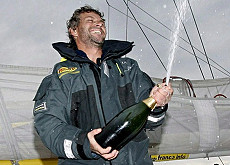Swiss sailors to brave solo circumnavigation

The world's most challenging solo sailing race starts on Sunday, with two Swiss competitors among the 30 attempting to circumnavigate the globe.
Bernard Stamm and Dominique Wavre will each be setting off from les Sables d’Olonne on France’s Atlantic coast to begin the Vendée Globe non-stop race, which takes place every four years.
The departure will be accompanied by the usual razzmatazz, with thousands of small vessels accompanying the racers and some 300,000 visitors descending on the little town, whose normal population is 15,000.
A stiff south-west breeze is forecast for the start, as the boats head into the notorious Bay of Biscay on their way to the southern hemisphere.
Later on they will face some of the toughest weather conditions in the world as they sail around Antarctica through the aptly named Roaring Forties and Furious Fifties.
The boats
The last race was won by Vincent Riou in 87 days 10 hours and 47 minutes. Many observers are expecting a new record – and warning that many won’t make it.
Most of the boats are based in just a few ports, and Wavre thinks that the fact that the skippers can each see what the others are doing to improve their boats could lead to problems.
“Everyone tries to go one better than his neighbour technically,” he explained to swissinfo. “It’s possible that some skippers have lost sight a little of the actual conditions that lie ahead of us.”
Wavre is one of a minority of competitors whose boat is not new. He is using a tried and tested yacht in which he has already sailed the equivalent of one and a half times around the world. But it has been completely refurbished.
“My strength is that I have a fast, reliable and ‘all round’ boat. I think we are among those with a good chance of putting in a good performance,” he told swissinfo.
Stamm’s boat is not new either. But he told swissinfo that he had completely transformed it.
“On paper I lack power. But in the Vendée Globe I don’t think that is everything. I think very powerful boats do not necessarily have an advantage when it comes to sailing off the wind,” he said.
As to whether his hi-tech boat included room for personal comfort, he was laconic.
“Let’s say that on a bed of nails, there is always a place where there are fewer nails. And I have a little heater, capable of warming half a cubic meter. Unfortunately it isn’t in the place where I shall be.”
Safety
Since the first Vendee Globe in 1989-90 safety measures have been stepped up considerably. Icebergs are surveyed by satellite and specialists keep a round-the-clock watch.
So-called gates may be set to keep the competitors away from drifting ice: they are obliged to pass to the north of these points. Australia has stipulated that the boats must pass within 1000 miles of its coast in order to limit the number of rescue operations.
But race director Denis Horeau does not believe this makes a fundamental difference.
“The idea of the Vendée Globe is still the same: a man who sails non-stop and unaided around the world and comes back to Les Sables d’Olonne. The improvements in safety don’t change the basic idea,” he told swissinfo.
swissinfo, based on an article in French by Pierre-Antoine Preti of Skippers magazine
The first Vendée Globe was sailed in 1989, and since 1992 has been held every four years.
The 2008-9 race is the sixth.
It is open to monohull yachts meeting the Open 60 class criteria.
The route basically follows the clipper route, down the Atlantic to the Cape of Good Hope, then clockwise round Antarctica and back to the starting point.
It generally runs from November to February, so as to coincide with the summer in the Southern Ocean.
So far, the race has always been won by a Frenchman.
Dominic Wavre was fifth in 2000-1, and fourth in 2004-5.
Bernard Stamm failed to finish in 2000-1 because of steering problems and did not compete in 2004.
A Franco-Swiss, Bernard Gallay, was eighth in 2000-1.
Although the French dominate the race, this year’s competitors also come from Switzerland, Austria, Canada, Spain, the UK and the US.
Although Switzerland is a landlocked country, it is a surprisingly successful sailing nation.
The Alinghi team, established by Swiss entrepreneur Ernesto Bertarelli, has twice won the Americas Cup.
Other successful round-the-world and trans-Atlantic sailors are the brothers Laurent and Yvan Bourgnon and Stève Ravussin, who all race multi-hulled boats.

In compliance with the JTI standards
More: SWI swissinfo.ch certified by the Journalism Trust Initiative











You can find an overview of ongoing debates with our journalists here . Please join us!
If you want to start a conversation about a topic raised in this article or want to report factual errors, email us at english@swissinfo.ch.